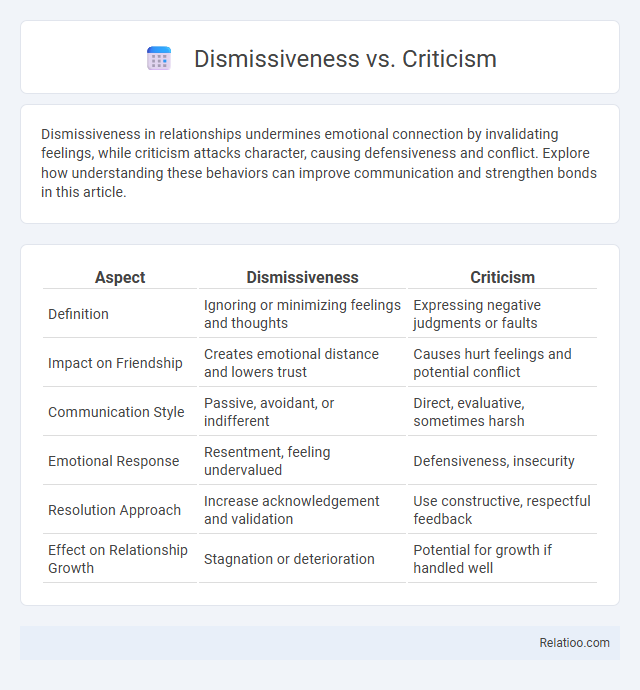Dismissiveness in relationships undermines emotional connection by invalidating feelings, while criticism attacks character, causing defensiveness and conflict. Explore how understanding these behaviors can improve communication and strengthen bonds in this article.
Table of Comparison
| Aspect | Dismissiveness | Criticism |
|---|---|---|
| Definition | Ignoring or minimizing feelings and thoughts | Expressing negative judgments or faults |
| Impact on Friendship | Creates emotional distance and lowers trust | Causes hurt feelings and potential conflict |
| Communication Style | Passive, avoidant, or indifferent | Direct, evaluative, sometimes harsh |
| Emotional Response | Resentment, feeling undervalued | Defensiveness, insecurity |
| Resolution Approach | Increase acknowledgement and validation | Use constructive, respectful feedback |
| Effect on Relationship Growth | Stagnation or deterioration | Potential for growth if handled well |
Understanding Dismissiveness: Key Traits and Examples
Dismissiveness involves ignoring or trivializing someone's feelings or opinions, often signaling emotional disengagement. Key traits include minimizing concerns, avoiding eye contact, and using sarcastic or condescending language that invalidates your perspective. Examples of dismissiveness are responding to a serious comment with jokes or changing the subject abruptly, which contrasts with criticism that directly evaluates or points out faults.
Defining Criticism: Constructive vs. Destructive
Criticism involves evaluating a behavior or action, which can be constructive when it aims to improve performance or destructive when it attacks personal character. Constructive criticism provides specific, actionable feedback that helps You grow, while destructive criticism often includes negative judgments that can harm confidence and morale. Understanding the distinction allows for healthier communication and more effective conflict resolution.
Psychological Impact of Dismissiveness
Dismissiveness undermines Your emotional well-being by invalidating feelings and experiences, often leading to increased stress, anxiety, and diminished self-esteem. Unlike criticism, which can be constructive or destructive depending on delivery, dismissiveness conveys indifference and rejection, intensifying psychological harm by fostering feelings of isolation and invisibility. Research shows that persistent exposure to dismissiveness correlates strongly with depressive symptoms and difficulty in forming secure interpersonal relationships.
Emotional Effects of Criticism
Criticism often triggers feelings of inadequacy and lowers self-esteem, leading to increased emotional distress and anxiety. Unlike dismissiveness, which can evoke feelings of rejection and invisibility, criticism focuses on perceived faults, intensifying self-doubt and emotional vulnerability. Understanding these distinct emotional effects is essential for improving communication and fostering healthier interpersonal relationships.
Dismissiveness vs. Criticism: Core Differences
Dismissiveness involves ignoring or minimizing someone's feelings or opinions, whereas criticism targets specific behaviors or ideas, often with the intent to evaluate or improve. You may experience dismissiveness as invalidation, leaving emotional needs unmet, while criticism provides concrete feedback that can lead to growth when constructive. Understanding these core differences helps you navigate interpersonal dynamics with greater empathy and clarity.
Recognizing Dismissive Behavior in Conversation
Recognizing dismissive behavior in conversation involves identifying patterns where your thoughts or feelings are minimized, ignored, or invalidated, often through gestures, tone, or interrupting speech. Dismissiveness differs from criticism since criticism provides negative feedback or evaluation, while dismissiveness outright rejects or belittles your input without consideration. Understanding these distinctions helps you navigate conversations more effectively and assert your perspective when encountering dismissive responses.
Healthy Forms of Criticism in Relationships
Healthy criticism in relationships involves constructive feedback that focuses on specific behaviors rather than personal attacks, fostering growth and understanding between partners. Unlike dismissiveness, which invalidates feelings and shuts down communication, or harsh criticism that can erode trust and self-esteem, balanced criticism encourages open dialogue and emotional safety. Establishing clear boundaries and expressing concerns with empathy promotes mutual respect and strengthens relational bonds.
Long-term Consequences of Dismissiveness
Dismissiveness, unlike criticism, often invalidates Your feelings, eroding trust and emotional intimacy over time, which can lead to increased resentment and communication breakdown in relationships. Repeated dismissiveness may cause long-term psychological effects such as lowered self-esteem, anxiety, and depression, as individuals feel unheard and unvalued. Understanding these impacts is crucial for fostering healthier interactions and ensuring emotional needs are respected for relationship longevity.
Transforming Dismissiveness into Constructive Feedback
Dismissiveness often shuts down communication, making your thoughts feel undervalued, while criticism targets specific behaviors or actions with the intent to improve. Transforming dismissiveness into constructive feedback involves acknowledging the person's perspective and offering clear, actionable suggestions for growth. This shift fosters understanding, promotes positive dialogue, and empowers you to build stronger, more respectful relationships.
Communication Strategies for Avoiding Dismissiveness and Negative Criticism
Effective communication strategies for avoiding dismissiveness and negative criticism involve active listening and expressing feedback with empathy. Using "I" statements and focusing on specific behaviors rather than personal attacks helps maintain constructive dialogue. Your ability to validate others' feelings while providing clear, respectful input fosters healthier interactions and reduces defensiveness.

Infographic: Dismissiveness vs Criticism
 relatioo.com
relatioo.com